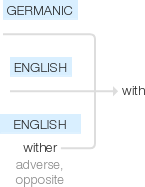With
Old English, probably a shortening of a Germanic preposition related to obsolete English wither ‘adverse, opposite’.
wiktionary
From Middle English with, from Old English wiþ(“against, opposite, toward, with”), from Proto-Germanic *wiþi, a shortened form of Proto-Germanic *wiþrą(“against”), which see for its derivation and other descendants cognate to the English preposition. In Middle English, the word shifted to denote association rather than opposition, from senses of attaining proximity through movement towards and then rest at a thing, displacing Middle English mid(“with”), from Old English mid(“with”), from Proto-Germanic *midi; an earlier model of this meaning shift exists in cognate Old Norse við; elsewhere, the converse meaning shift is exposed by Old South Arabian 𐩨𐩺𐩬 (byn, “between, amid”) spawning Old South Arabian 𐩨𐩬 (bn, “against”) and even likewise frequent reverse meaning 𐩨𐩬 (bn, “from”).
From Middle English withe, wiþþe, from Old English wiþþe. More at withe.
etymonline
with (prep.)
Old English wið "against, opposite, from, toward, by, near," a shortened form related to wiðer, from Proto-Germanic *withro- "against" (source also of Old Saxon withar "against," Old Norse viðr "against, with, toward, at," Middle Dutch, Dutch weder, Dutch weer "again," Gothic wiþra "against, opposite"), from PIE *wi-tero-, literally "more apart," suffixed form of *wi- "separation" (source also of Sanskrit vi "apart," Avestan vi- "asunder," Sanskrit vitaram "further, farther," Old Church Slavonic vutoru "other, second"). Compare widow (n.).
Sense shifted in Middle English to denote association, combination, and union, partly by influence of Old Norse vidh, and also perhaps by Latin cum "with" (as in pugnare cum "fight with"). In this sense, it replaced Old English mid "with," which survives only as a prefix (as in midwife). Original sense of "against, in opposition" is retained in compounds such as withhold, withdraw, withstand.
Often treated as a conjunction by ungrammatical writers and used where and would be correct. First record of with child "pregnant" is recorded from c. 1200. With it "cool" is African-American vernacular, recorded by 1931. French avec "with" was originally avoc, from Vulgar Latin *abhoc, from apud hoc, literally "with this."
